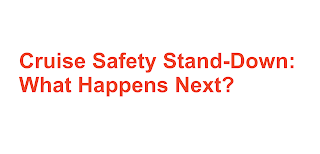Cruise has announced a fleet-wide safety stand-down. This involves suspending driverless operations in all cities, reverting to operation only with in-vehicle safety drivers.
I'm glad to see this step taken. But it is crucial to realize that this is the first step in what it likely to prove a long journey. The question is, what should happen next?
Loss of public trust is an issue as they say. And perhaps there was an imminent ban in another state forcing their hand to be proactive. But the core issues almost certainly run deeper than mismanaging disclosure of the details of a tragic mishap and doing damage control with regulatory trust.
The real issues will be found to have their roots in the culture of the company. Earnest, smart employees with the best of intentions can be ineffective at achieving acceptable safety if the corporate culture undermines their official company slogan of "safety first, always."
This is the time to ask the hard questions. The answers might be even harder, but they need to be understood for Cruise to survive long term. It is questionable whether they could survive a ban in another state. But escaping that via a stand-down only to implement a quick fix won't be enough. If we see business as usual restored in the next few weeks, that is almost certainly a shallow fix. It will simply be a matter of time before a future adverse situation happens from which there will be no recovery.
This is the moment for Cruise to decide to lean into safety.
The details are too much for a post like this, but the topics alone indicate the scope of what has to be considered:
- Safety engineering -- Have they effectively identified and mitigated risks?
- Operational safety -- Safety procedures, inspections, maintenance, management of Operational Design Domain limits responsive to known issues, field data feedback, etc. This includes ensuring their Safety Management System (SMS) is effective.
- System engineering -- Do the different pieces work together effectively? This includes all the way from software in 3rd party components to vehicle integration to ability of remote operators to effectively manage gaps in capabilities ... and more
- Public messaging and regulatory interface -- Building genuine trust, starting with more transparency. Stop the blame game; accept accountability. Own it.
- Investor expectations -- Determine a scaling plan that is sustainable, and figure out how to fund it in the likely case it is longer than what was previously promised
- Definition of acceptable safety -- More concrete than seeing how it turns out based on crash data, with continual measurement of predictive metrics
- Safety culture -- Which underlies all of the above, and needs to start at the top.
And I'm sure there are more; this is just a start.
Near-term, the point of a safety stand-down is to stabilize a situation during uncertainty. The even more important part comes next: the plan to move forward. It will take weeks to take stock and create a plan, with the first days simply used to organize how that is going to happen. And months to execute that plan. Fortunately for Cruise there is an existing playbook that can be adapted from Uber ATG's experience with their testing fatality in 2018. Cruise should already have someone digging into that for initial ideas.
An NTSB-style investigation into this mishap could be productive. I think such an investigation would be likely to bring to light new issues that will be a challenge to the whole industry involving expectations for defensive driving behaviors and post-crash safety. If NTSB is unable to take that on, Cruise should find an independent organization who can do something close. But such an investigation is not the fix, and cultural improvements at Cruise should not wait for one to conclude. However, an independent investigation can be the focal point for deeper understanding of the problems that need to be addressed.
------------------------------------------------
Philip Koopman is a professor at Carnegie Mellon University in Pittsburgh Pennsylvania, USA, who has been working on self-driving car safety for more than 25 years. https://users.ece.cmu.edu/~koopman/


No comments:
Post a Comment
All comments are moderated by a human. While it is always nice to see "I like this" comments, only comments that contribute substantively to the discussion will be approved for posting.